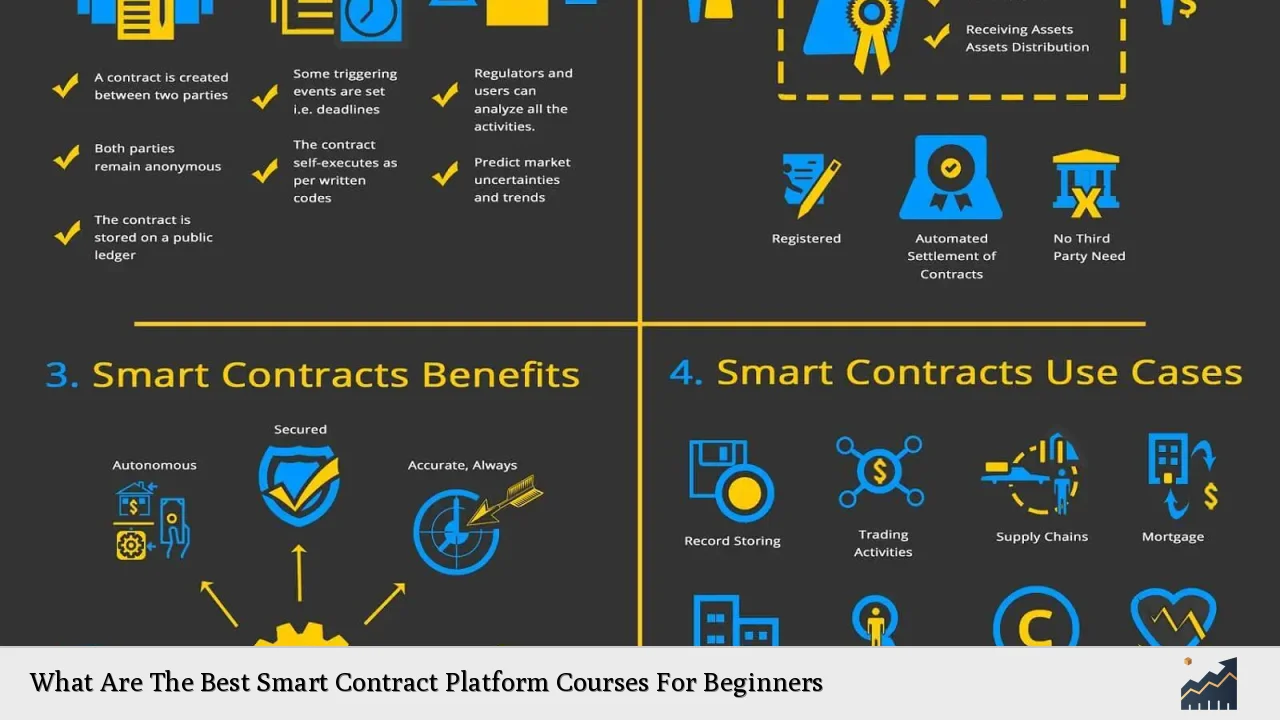As the blockchain ecosystem continues to evolve, smart contracts have emerged as a pivotal technology, enabling automated, self-executing agreements without intermediaries. For beginners looking to delve into this field, selecting the right educational resources is crucial. This article provides a comprehensive overview of the best smart contract platform courses available for beginners, incorporating current market trends and expert insights.
| Key Concept | Description/Impact |
|---|---|
| Smart Contracts | Self-executing contracts with terms directly written into code, enhancing security and efficiency in transactions. |
| Solidity Programming | The primary language for writing smart contracts on the Ethereum blockchain, essential for developers in the blockchain space. |
| Decentralized Applications (DApps) | Applications that run on a blockchain network, utilizing smart contracts to function without a central authority. |
| Blockchain Fundamentals | A foundational understanding of blockchain technology is necessary for effectively learning about smart contracts. |
Market Analysis and Trends
The smart contract market is experiencing rapid growth, projected to reach USD 1.9 billion by 2034, expanding at a compound annual growth rate (CAGR) of 23.8% from USD 230.2 million in 2024. This growth is driven by the increasing adoption of decentralized finance (DeFi), non-fungible tokens (NFTs), and the need for enhanced security in digital transactions.
- Current Market Size: The global smart contracts market was valued at approximately USD 315.1 million in 2023.
- Growth Drivers: Key factors include the rise of DApps, regulatory compliance needs, and the integration of smart contracts with traditional legal frameworks.
- Regional Insights: North America leads the market share at about 43%, followed by Europe and Asia-Pacific, with significant growth expected in regions like China, which has a projected CAGR of 25.9%.
Implementation Strategies
For beginners interested in smart contract development, several high-quality courses are available that cater to different learning styles and objectives:
- Cyfrin Updraft: Offers over 50 hours of free content covering blockchain basics, Solidity development, and smart contract security. This platform is ideal for those starting from scratch and looking for hands-on projects guided by industry experts.
- Alchemy University: Provides a comprehensive Ethereum Developer Bootcamp that emphasizes practical skills through coding challenges and real-world applications.
- Udemy Courses: Courses like “Ethereum and Solidity: The Complete Developer’s Guide” offer structured learning paths with extensive resources. These courses typically range from beginner to intermediate levels and include practical assignments to reinforce learning.
- Coursera Specializations: Institutions like the University at Buffalo offer specialized courses focusing on blockchain fundamentals and smart contract development, allowing learners to earn certificates upon completion.
Risk Considerations
While engaging in smart contract development presents numerous opportunities, it also comes with inherent risks:
- Security Vulnerabilities: Smart contracts are susceptible to bugs and exploits. Developers must prioritize security practices such as thorough testing and auditing using tools like Slither or Mythril.
- Regulatory Risks: As governments worldwide begin to regulate blockchain technologies more stringently, staying informed about compliance requirements is essential for developers.
- Market Volatility: The cryptocurrency market’s volatility can impact the demand for smart contracts and related applications significantly.
Regulatory Aspects
Understanding the regulatory landscape is crucial for anyone entering the field of smart contracts:
- Compliance Requirements: Developers must be aware of local laws governing blockchain technology and digital assets to ensure their applications comply with regulations.
- Data Privacy Laws: With increasing scrutiny over data privacy, especially in regions like Europe (GDPR), developers must consider how their smart contracts handle personal data.
Future Outlook
The future of smart contracts looks promising as they become integral to various industries beyond finance:
- Integration with IoT: Smart contracts are expected to play a significant role in automating processes within the Internet of Things (IoT), enhancing operational efficiency across sectors.
- Expansion into New Markets: Industries such as supply chain management, healthcare, and real estate are increasingly adopting smart contracts to streamline operations and reduce costs.
- Emergence of New Technologies: Innovations such as quantum computing could further transform how smart contracts are developed and executed.
Frequently Asked Questions About What Are The Best Smart Contract Platform Courses For Beginners
- What is a smart contract?
A smart contract is a self-executing contract where the terms are directly written into code on a blockchain. - Why should I learn Solidity?
Solidity is essential for developing smart contracts on Ethereum, which is one of the most widely used blockchain platforms. - Are there free resources available for learning about smart contracts?
Yes, platforms like Cyfrin Updraft offer free courses covering various aspects of smart contract development. - What prerequisites do I need before taking these courses?
A basic understanding of programming concepts is beneficial; familiarity with JavaScript can be particularly helpful. - How long does it take to become proficient in smart contract development?
The timeline varies by individual commitment but expect several months of study and practice to gain proficiency. - What are some common mistakes when developing smart contracts?
Common mistakes include neglecting security audits, failing to test thoroughly, and not considering regulatory compliance. - Can I build decentralized applications (DApps) without prior experience?
While prior experience helps, many beginner-friendly courses provide step-by-step guidance on building DApps from scratch. - What career opportunities exist in the field of smart contracts?
Opportunities include roles such as blockchain developer, security auditor, project manager in blockchain projects, or even entrepreneurial ventures in DeFi or NFT spaces.
In conclusion, as interest in blockchain technology continues to grow globally, investing time in learning about smart contracts through reputable courses will provide individuals with valuable skills applicable across various industries. By leveraging these educational resources effectively while being mindful of risks and regulatory considerations, aspiring developers can position themselves favorably within this dynamic field.

